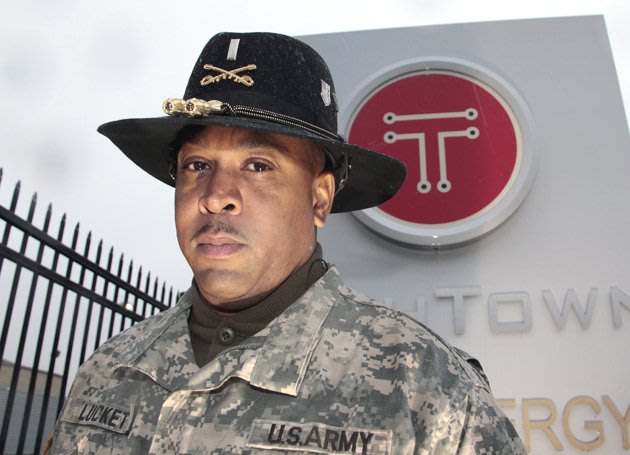War drawdowns wreak havoc on Guard soldiers' lives
By LOLITA C. BALDOR | AP – 3 hrs agoWASHINGTON (AP) — Two months ago,
Demetries Luckett left his job in
Michigan, turned in his cable box, sent his daughter to live with her mother, and headed for Camp Shelby in Mississippi.
As a 1st lieutenant in Michigan's National Guard, he was being deployed to Afghanistan.
But just a month after he arrived for training, the Army decided Uncle Sam didn't need him after all.
Now Luckett's unemployed and back home in Harper Woods, Mich. — a victim of the Obama administration's ongoing effort to pull at least 33,000 U.S. troops out of Afghanistan by next fall.
Unlike active-duty soldiers who are stationed at U.S. military bases across the country and can be sent on a moment's notice to a conflict anywhere in the world — the nation's citizen soldiers have civilian jobs and lives they have to set aside when they get those deployment notices.
And unlike active-duty soldiers, Guard members may have little to go back to, if their country changes its mind.
Luckett is not alone.
In the last 60 days, as many as 8,900 Army National Guard soldiers were either sent home early from Iraq or Afghanistan, or were told that the Pentagon's plans to send them to war had either been shelved or changed. As a result, U.S. military and Guard leaders have been scrambling to find alternative missions for many of the soldiers — particularly those who had put their lives and jobs on hold and were depending on the deployment for their livelihood.
"If you're a 25-year-old infantryman, and you're a student at Ohio State University, and you decide not to register for school in July because you were going to mobilize, and we say your services aren't needed anymore — that becomes a significantly emotional event in that person's life," said Col. Ted Hildreth, chief of mobilization and readiness for the Army National Guard.
Guard members scheduled for deployment, he said, often quit or take extended leaves from their jobs, put college on hold, end or break their apartment leases, sell or rent their houses, and turn their medical or legal practices over to someone else. And in some cases, in this flagging economy, Guard members who may be unemployed or underemployed are relying on the year-long paycheck, which can include extra money for combat pay or tax-free benefits.
"These are commitments and contracts that have been signed, and so when these changes happen, they are not insignificant," he said. "So we work with the unit, the country team and the joint force headquarters to define who are no-kidding hardships and who we had to work to find other employments opportunities to fulfill the 400-day mobilization commitment that we made to that soldier."
In the coming weeks, as America works to extricate itself from two wars, the U.S. will pull the remaining 18,000 troops out of Iraq, and withdraw 10,000 forces from Afghanistan. Another 23,000 or more will come out of Afghanistan by next fall.
And while the political ramifications of the war drawdowns are hotly debated topics, there is often little said or known about the cascading effects such decisions have on the lives, jobs and schooling of the National Guard and Reserve troops.
Guard units are notified of their deployments as much as two years in advance, so they make long-term plans to meet the year-long military commitment.
But to meet the often-changing withdrawal timetables for Iraq and Afghanistan, the Pentagon has had to abruptly shuffle units, and even individual soldiers, around. The major moves include shifting forces from Iraq to new missions in Kuwait or to Afghanistan.
During a hearing on Capitol Hill, Gen. Martin Dempsey, chairman of the Joint Chiefs of Staff, said the military tries to do all it can to avoid changing deployment orders given to National Guard units once they are notified.
If a unit has been mobilized, he said, "we will find a place to use it," particularly if it is an aviation unit, since those are in high demand.
Usually, he said, officials try to identify soldiers who prefer not to deploy, since there often are some who are happy to stay home. Then the rest of the unit will, if possible, be sent to a different mission in the same country or to another location.
For example, the 37th Infantry Brigade Combat Team, made up of more than 2,300 soldiers from Ohio and Michigan, was initially scheduled to go to Afghanistan in early October to do combat and other operations.
But when Pentagon leaders decided many weren't needed, they scrounged for other missions so that the soldiers who really wanted or needed to deploy could do so.
Maj. Jeff Kinninger, executive officer for the 126th Cavalry Squadron, was another soldier who got to Camp Shelby, then was told not to deploy. But for Kinninger and his family, it was more of a welcome decision because he has a full-time job working for the National Guard in Grand Rapids.
"For me, this would have been three deployments in the last seven years, so I wasn't too disappointed," said Kinninger, 42, who had served in Iraq in 2005 and 2008. "I'm disappointed not to be there with my soldiers, but my family is happy I'm not going."
His squadron is part of the 37th IBCT. So, of the 430 squadron members who headed to Camp Shelby to prepare to deploy, more than 200 were told they weren't needed. After sorting out who wanted to go home, military officials were able to find assignments for all the rest, Kinninger said.
Two other brigades are going through similar struggles — the 27th Infantry Brigade Combat Team, based in New York, and the 29th Combat Aviation Brigade, which includes soldiers from across the U.S.


